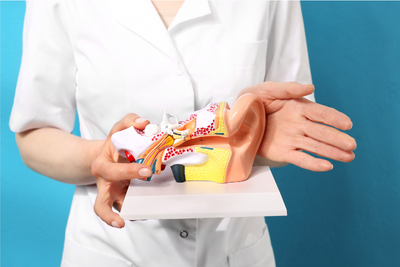When you think about hearing loss, it’s not uncommon to assume that it only affects your ears. Your ability to hear has a significant and varied impact on your ears, auditory system, brain, health, and overall quality of life. There’s no shame in seeking treatment for hearing difficulties, yet many people are reluctant to do so until they have serious communication difficulties. Depending on the cause, an audiologist or ENT doctor in Encino or West Hills can provide treatment to counteract the effects of hearing loss. These professionals also specialize in diagnosing and treating other related disorders, such as tinnitus and balance issues.
To better understand the effects of the condition, read this to learn why hearing loss treatment is so essential for a healthy brain and quality of life.
- How Does Hearing Loss Occur?
- How Hearing Loss Affects the Brain
- How Hearing Loss Treatment Supports the Brain
- Is Hearing Loss Preventable?
- What Are the Different Types of Hearing Loss?
- How is Hearing Loss Treated?
- Key Takeaways
How Does Hearing Loss Occur?
The process of hearing starts in the ears, which then send signals to your brain to interpret. The sound waves cause the tympanic membrane in your middle ear to vibrate which then transmits to your inner ear. Inside this structure are tiny hair cells that convert sound vibrations into electrical impulses, which are sent to the brain through the auditory nerve. Your brain interprets these electrical impulses as sounds, enabling you to hear them.
How Hearing Loss Affects the Brain
Hearing loss increases the risk of dementia and other cognitive disorders. This is partially due to the restructuring the brain does to process sound and speech. Hearing loss is also known to cause anxiety, irritability, depression and other negative mood changes, isolation, and increased stress due to the communication difficulties it causes.
The auditory areas of your brain become more dysfunctional even with milder or temporary hearing loss. As the condition progresses, you eventually end up using more of your brain’s advanced functions to compensate. While this may initially make it easier for you to hear more, your ability to process, think and respond appropriately suffer. This effect becomes more obvious over time.
How Hearing Loss Treatment Supports the Brain
Hearing loss has a negative effect on your brain the longer it goes untreated. Your brain plays an essential part in processing the sounds sent from your ears. It enables you to hear and communicate better and supports the brain. This is why hearing loss treatment is so important.
With hearing loss, damage to the ear prevents your brain from receiving these signals. When the cells in your brain that normally interpret sound don’t receive the appropriate signals, the brain thinks they are malfunctioning or not being used properly. This triggers neuroplasticity, a process in which your brain forms new neural connections and adapts to change to help you process new information and deal with concepts and challenges, including processing sounds properly. The parts of the brain responsible for sound processing and speech, essentially your ability to communicate, start to rely more on other cognitive functions necessary for memory, thinking, learning, and problem-solving.
As hearing loss progresses, it becomes difficult to understand what’s being said, although sounds are heard. Hearing loss decreases stimulation to the parts of the brain responsible for sounds and communication; as a result, those areas deteriorate. The longer this occurs, the greater the strain it places on the brain, increasing the likelihood of cognitive decline.
Hearing loss treatment is necessary to ensure these areas of the brain continue to receive the proper amount of stimulation to preserve normal cognitive function.
Is Hearing Loss Preventable?

What Are the Different Types of Hearing Loss?
Hearing loss is often attributed to infections and structural irregularities within the ears. It’s important to see an ENT in Encino or West Hills for a proper diagnosis to ensure early and appropriate treatment. Below are the different types of hearing loss.
Conductive hearing loss is caused when sounds aren’t transmitted from the outer or middle ear to the inner ear.
Sensorineural hearing loss is the most common type and is caused by damage to the inner ear or the auditory nerve. Sensorineural hearing difficulties are common with exposure to loud noises, aging, and certain medical conditions.
Mixed hearing loss is the combination of conductive and sensorineural hearing loss.
Central hearing loss is rare and occurs when there’s damage to the brain.
Auditory processing disorder is related to the brain’s inability to process sounds and is generally diagnosed in children.
How Is Hearing Loss Treated by ENT Doctors in Encino and West Hills?
Early treatment for hearing loss is necessary to counteract the negative effects on the ears and brain. Without it, the ability to retain and process information, remember things, focus, and think are compromised. Because there are various medical conditions and disorders of physiological and physical nature that can impair the ability to hear, medical examinations and diagnostics are necessary.
There are many treatment options available for hearing loss, ranging from medications to hearing aids and surgery. Treatments are determined by the cause of hearing disturbance. Below are some of the various types of ENT doctors in Encino an West Hills recommend for hearing loss:
Hearing aids that are worn in or behind the ear to amplify sound.
Cochlear implants are surgically implanted in the inner ear to help the wearer maintain some sense of sound with mild to severe hearing loss.
Assistive listening devices enhance the ability to hear background noises better in certain situations like on phones, computers, mobile devices, and televisions.
Rehabilitation therapy to learn how to communicate more effectively. Severe cases may incorporate speech therapy, lip-reading classes, and support groups into treatment.
Surgery is necessary for some types of hearing loss, such as removing foreign objects or fixing a structural problem in the ear.
Ear tubes are surgically implanted to allow fluid to drain from the ear canal to prevent blockages and infection. Ear tubes can be temporary or permanent and are often prescribed for children who experience frequent ear infections.
Medications may be prescribed to treat infections like sinusitis and other infections or underlying conditions like Meniere’s disease.
It’s not uncommon for hearing loss to occur because of severe wax buildup or an infection in the ear. Treatment requires a special ear cleaning by an ENT doctor in Encino and/or West Hills. Infections are usually treated with medications and in some cases, may require multiple treatment therapies, including surgery to restore hearing function.
Key Takeaways
Hearing loss treatment is necessary to protect your brain and its ability to function. Not only does treatment help minimize and, in some cases, reverse the negative changes that occur in the absence of proper auditory processing, but it also helps to preserve your hearing and physical health, emotional well-being, and overall quality of life. Early medical intervention is critical.
To learn more about how hearing loss can impact your brain or learn treatment options suitable for your situation, please contact the ENT doctors in Encino and West Hills at CV/ENT Surgical Group today!

